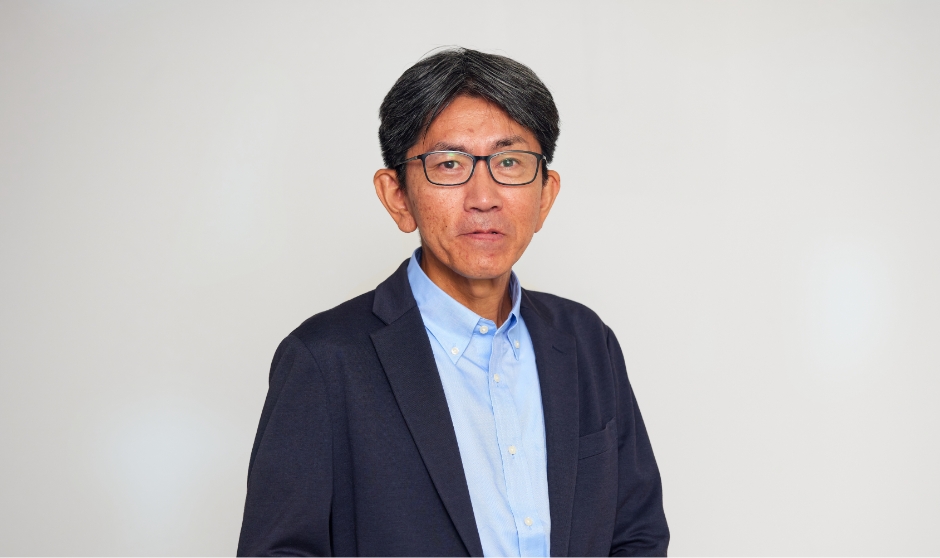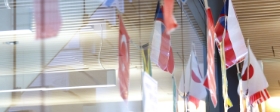ProfessorKUBO, Koji

Most students of the Faculty of International Social Sciences are more interested in Western countries, and few consciously think about Asia. The four lecture courses I teach all focus on Asian countries, especially Southeast Asia. Our lives are connected to Asian countries in many ways. Most of the computers and smartphones you are using to read this message are made in China. Asian people working in convenience stores and restaurants are ordinary scenes in Tokyo. The purpose of my lecture courses is to help students nurture an eye to see various linkages between Japan and Asian countries from the viewpoints of social sciences. My hope is that my class will encourage you to think consciously about Asia.
Courses
- Introduction to the Asian Economy
- Area Studies Methods
- Emerging Asian Economy and Society
- Politics and Economy in Southeast Asia
- Basic Seminar
- Advanced Seminar Ⅰ・Ⅱ
- Graduation Seminar
In "Introduction to Asian Economies" (first year, in Japanese), students gain an overview of the interlinkages of Asian countries with Japan in flows of people, goods, money, and technology, which serves as the foundation for their subsequent studies. In "Methods of Area Studies" (second year, in Japanese), students familiarize themselves with approaches of various social science disciplines applied to political, economic, and social issues in Asian countries. In "Emerging Asian Economy and Society" (second year, in English), students read English-language literature on the economic development in Asia and develop their ability to discuss socio-economic problems in English. In "Politics and Economy in Southeast Asia" (third year, in English), students acquire the ways of thinking of political scientists about causal inference of the political and economic issues of Southeast Asian countries.
Seminar
Profile
| 2021 | Professor, Faculty of International Social Sciences, Gakushuin University |
| 2017 | (IDE-JETRO senior research fellow sent abroad) Visiting Researcher, Institute of Asian Studies, Chulalongkorn University, Thailand (to 2020) |
| 2012 | Researcher, Bangkok Research Center, Japan External Trade Organization (to 2016) |
| 2006 | (IDE-JETRO research fellow sent abroad) Visiting Researcher, Department of Agricultural Planning, Ministry of Agriculture and Irrigation, Myanmar (to 2008) |
| 2001 | Researcher, Institute of Developing Economies, Japan External Trade Organization (IDE-JETRO) (to 2021) |
| 2000 | Started doctoral program at the Osaka School of International Public Policy, Osaka University (Doctoral degree conferred in 2018) |
| 1999 | MA in Development Economics (with distinction), University of Sussex, UK |
| 1992 | Administrative staff, Sumitomo Electric Industries, Ltd. (to 1997) |
| 1992 | BA in Economics, Kyoto University |
Fields of Specialization
Area studies (Myanmar)Development economicsSoutheast Asian economy and societyResearch content
I have been analyzing the economic problems facing developing countries in Southeast Asia, especially Myanmar. My research style is to gather grass-root information from the field and make causal inferences about strange phenomena occurring in developing countries as if putting together pieces to solve a jigsaw puzzle. My research topics are miscellaneous, including Myanmar's foreign exchange system and informal currency exchange, the financial conditions of undocumented Burmese migrant workers in Thailand, exports/smuggling of tropical fruits from Southeast Asian countries to China.
Major Publications
- Kubo, K., B. Pritchard, and A.S. Phyo.(2021). How Chinese demand for fresh fruit and vegetable is creating new landscapes of rural development and vulnerability in Southeast Asia: Insights from the Myanmar melon frontier. Geoforum 122, 32-40,DOI: 10.1016/j.geoforum.2021.03.008
- Kubo, K., V. Sam, and Y. Chea (2021). Currency exchange under payments dollarization: converting a source of efficiency loss into a catalyst for financial development in Cambodia. Journal of the Asia Pacific Economy. DOI: 10.1080/13547860.2021.1879351
- Kubo, K. (2018). Myanmar's Foreign Exchange Market: Controls, Reforms, and Informal Market. Singapore: Springer. DOI: 10.1007/978-981-13-1789-7
- Kubo, K. (2017). Evolving informal remittance methods among Myanmar migrant workers in Thailand. Journal of the Asia Pacific Economy 22(3), 396-413. DOI: 10.1080/13547860.2016.1268397
- Kubo, K. (2017). Impacts of foreign exchange auctions on the informal market rate in Myanmar. Global Economic Review 46(2), 189-202. DOI: 10.1080/1226508x.2017.1292858
- Kubo, K. (ed) (2017). Dollarization and De-dollarization in Transitional Economies of Southeast Asia. Cham: Palgrave Macmillan. DOI: 10.1007/978-3-319-57768-5
- Kubo, K. (2014). Foreign exchange market reform in Myanmar: achievements and challenges. Journal of Southeast Asian Economies 31(2), 210-224. DOI: 10.1355/ae31-2d
- Kubo, K. (2014). Myanmar's non-resource export potential after the lifting of economic sanctions: a gravity model analysis. Asia-Pacific Development Journal 21(1), 1-22. DOI: 10.18356/df0bf4ec-en
- Kubo, K. (2013). Myanmar's two decades of partial transition to a market economy: a negative legacy for the new government. Post-Communist Economies 25(3), 357-370 DOI: 10.1080/14631377.2013.813141
- Kubo, K. (2013). Rice yield gap between Myanmar and Vietnam: a matter of price policy or public investment in technology? Asian Journal of Agriculture and Development 10(1), 1-24. DOI: 10.22004/ag.econ.199104
- Kubo, K. (2013). Real exchange rate appreciation, resource boom, and policy reform in Myanmar. Asian-Pacific Economic Literature 27(1), 110-126. DOI: 10.1111/apel.12005
- Kubo, K. (2012). Trade policies and trade misreporting in Myanmar. ASEAN Economic Bulletin 29(2), 146-159. DOI: 10.1355/ae29-2e
- Kubo, K. (2011). Natural gas export revenue, fiscal balance and inflation in Myanmar. ASEAN Economic Bulletin 28(3), 374-387. DOI: 10.1355/ae28-3f
- Kubo, K. (2008). Do foreign currency deposits promote or deter financial intermediary development in low-income countries? An empirical analysis of cross-country data. The Developing Economies 46(3), 264-289. DOI: 10.1111/j.1746-1049.2008.00066.x
- Kubo, K. (2007). Determinants of parallel exchange rate in Myanmar. ASEAN Economic Bulletin 24(3), 264-289. DOI: 10.1355/ae24-3a
- Kubo, K. (2006). The degree of competition in the Thai banking industry before and after the East Asian crisis. ASEAN Economic Bulletin 23(3), 325-340. DOI: 10.1355/ae23-3c
Others
JSPS Grant-in-aid for Scientific Research (C) "Examining separability of crop boom and land grabbing in developing countries: a case study of the melon boom in Myanmar" (FY2021-FY2025) Principal Investigator
JSPS Grant-in-Aid for Scientific Research (C) "Empirical analysis of the impact of Chinese Yuan trading on the US dollar market in Myanmar" (FY2018-FY2021) Co-investigator
JSPS Grant-in-Aid for Scientific Research (C) "Foreign exchange policy reforms and informal foreign currency transactions in Myanmar" (FY2018-FY2020) Principal Investigator
JICA Ogata Research Institute "Empirical study on the promotion of home currency in Cambodia" (FY2016-FY2019) Co-investigator
JSPS Grant-in-Aid for Scientific Research (C) "De-dollarization in Myanmar" (FY2014-FY2017) Principal Investigator
Contact

Office : South 2-308

 Japanese
Japanese

 Contact Us
Contact Us